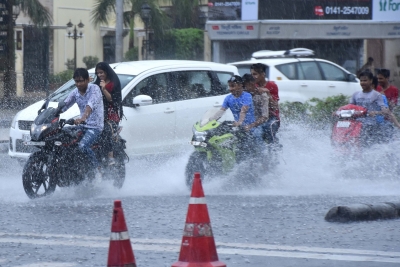
Jaipur, May 4 (IANS) Rajasthan, which is also called the desert state, has received four times more rain than normal from March 1 to May 3 this year, Met department officials have confirmed.
The Met department also said that there will be no heatwave till the second week of May, but there is a possibility of a cyclone forming in the south-east of the Bay of Bengal by May 9.
The Director General of India Meteorological Department (IMD), Mrutyunjay Mohapatra, said that the route of the cyclone will be predicted soon.
According to experts, like cyclone ‘Tauktae’ in 2021, this year’s cyclone ‘Mocha’ may affect some parts of Rajasthan as well. However, an official announcement has not been made on this yet.
Stating that the cyclone is likely to move northwards, Mahapatra said that on May 6, a low pressure area will form in the Bay of Bengal. The cyclone has been named ‘Mocha’ by Yemen after a port city on the Red Sea.
In March and April, the average rainfall in the whole of Rajasthan is 10.1 mm, but that much rain lashed the state between May 1 and May 3 alone.
A Met official said, “This series of rain and storm will continue for two-three more days. The Meteorological Centre in Jaipur has issued a yellow alert for many cities in the state till May 6.”
Looking at district-wise report, the average rainfall was more than 50 mm in 10 districts, including Rajsamand, Alwar, Nagaur, Bundi, and Jaipur.
Due to the rains accompanied by hailstorm, the temperature in Rajasthan did not touch 40-degree Celsius for the past one week. On April 27, the maximum temperature in Churu was recorded at 40-degree Celsius, after which the mercury did not touch 40-degree Celsius in any city across the state.
In some cities, the day temperature went below 30-degree Celsius for the past two-three days, an unusual developoment in this time of the year.
Rajsamand district in Udaipur division received heavy rains over the last two weeks. The average rainfall between March 1 and May 3 in the district is 7.8 mm, but this year it received 71.1 mm rainfall during this period.
Similarly, Dungarpur received 900 per cent more than the average rainfall for this time of the year, from 2.6 mm to 26 mm.
–IANS
arc/arm










